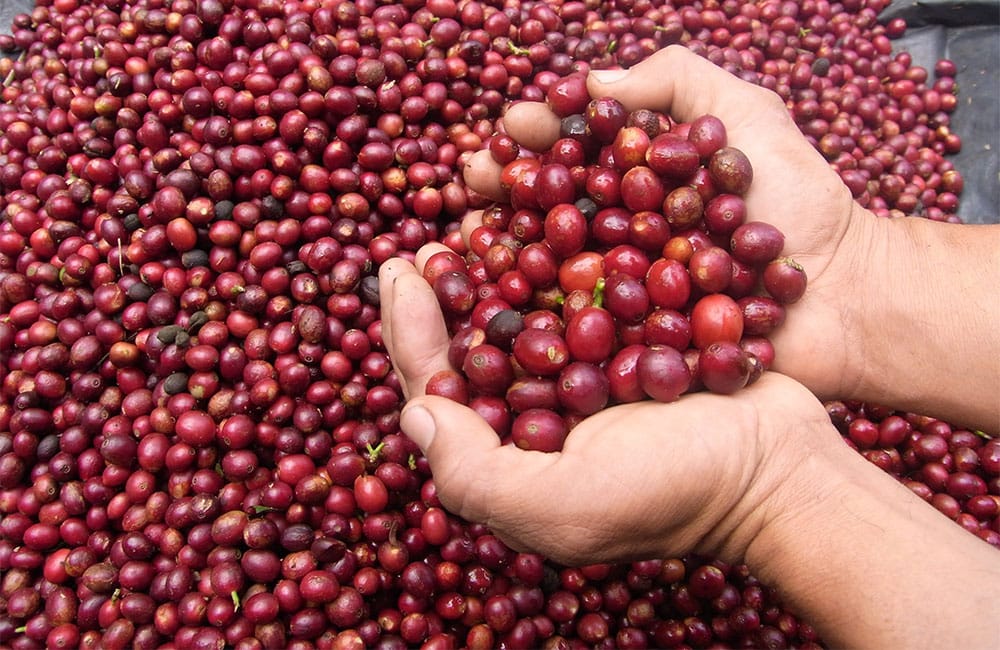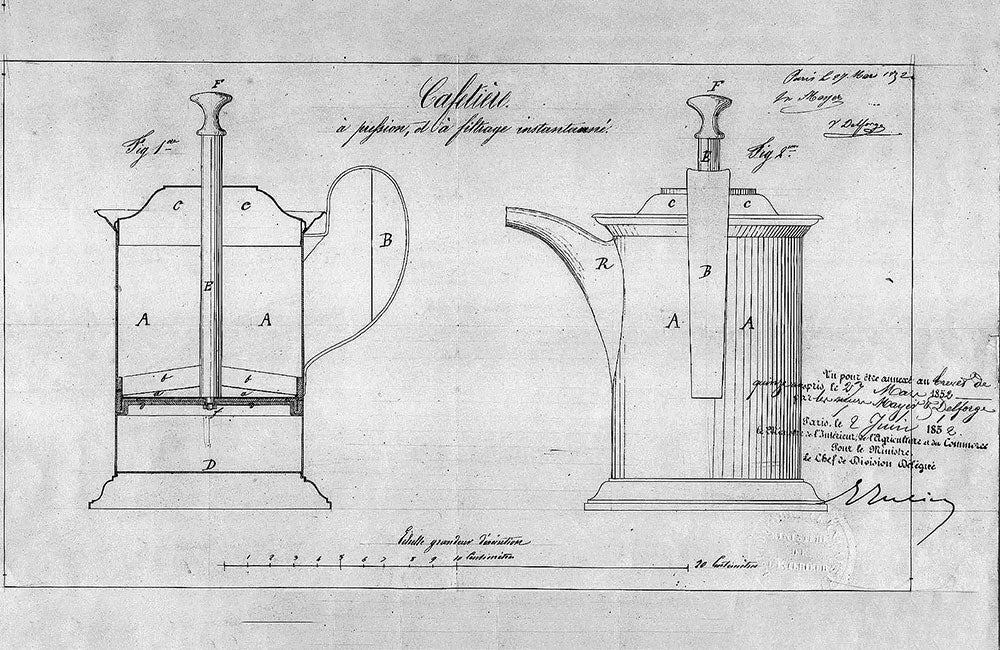Qué es el café de finca y por qué lo deberías probar
El origen del café es un elemento trascendental a la hora de valorar su sabor.
Cuando hablamos de un café de finca, nos estamos refiriendo a que conocemos no solo el país de origen de ese café, sino la finca en particular donde se ha cultivado.
Cada grano de café refleja la forma en la que ha sido cultivado, las propiedades de la tierra o las características climáticas del lugar exacto donde ha sido plantado, recolectado y procesado.
Cada grano, en definitiva, tiene su pequeña historia que contar.
El café de finca nos permite conocer con precisión cuál es esa historia y, sobre todo, ofrecer un producto con un rico perfil organoléptico y de una calidad excepcional.

Marcial Olivera, productor de cafés de especialidad en la región de Nuevo Trujillo, Perú.
Café de finca vs. café de origen
El café de origen puede hacer referencia a todo aquel que procede de un productor, un cultivo, una región o un país, o todo al mismo tiempo. No es específico y se trata, por tanto, de un concepto demasiado amplio.
Pongamos un ejemplo, vas al supermercado y encuentras un café de origen de Brasil. La etiqueta únicamente especifica que este café proviene de un país que acumula más del 30% de la producción mundial.
Estos cultivos están repartidos en regiones que nada tienen que ver entre sí, ni en el clima, ni en el terreno, ni en el proceso de recolección. Por tanto, sus frutos tampoco tendrán características homogéneas.

Cada finca cuenta con sus sistemas particulares de recolección y procesado, convirtiendo cada café de finca en un mundo.
Parte de la filosofía del café de especialidad es crear perfiles organolépticos que reflejen las características de cada café en particular.
Esto se debe de trabajar desde el momento en el que se planta el cafeto hasta que se tuesta o prepara el café.
Todos los elementos que influyen en el crecimiento y maduración de las cerezas de café son importantes para esto.
El lugar de origen, el terreno, el clima, el cuidado de las plantas, el momento de la cosecha o la forma de procesado, todo influirá en el rango sensorial de cada café.

Almacenaje antes de la distribución
Por eso es importante que los cafés se separen en pequeños lotes dependiendo de todos los factores mencionados.
El café de finca significa que se han creado estos pequeños lotes atendiendo a estas características. Esto, a su vez, influirá en la forma en que se tuesta y prepara.
Comprar un café por su origen es algo parecido a comprar un ‘vino de España’, sin atender a las diferentes denominaciones de origen y características consustanciales de cada región.
Por otro lado, comprar un café de finca significa que se ha prestado atención a todos los factores que hacen un café especial y único.
Las ventajas del café de finca
Con el café de finca vamos un paso más allá que con la denominación de su origen.
No hablamos solo de un espacio geográfico, sino de una forma de entender el proceso de cultivo de café, que está estrechamente relacionada con el agricultor local, el terroir, las variedades botánicas y las fórmulas de procesado.
Los frutos cosechados en una misma finca garantizan una consonancia en todas las particularidades que hacen del café un producto único en su perfil sensorial: su cuerpo, su aroma, su acidez.
Cada lote, incluso dentro de una misma finca, ya sea por la variedad botánica, su momento de cosecha o por su procesado tendrá unas características únicas.

Cafeto de la variedad Bourbon en la finca Palo Blanco, Guatemala.
El café de finca es, por tanto, una rigurosa forma de asegurarnos que obtenemos un café de especialidad excepcional.
Algunas de las ventajas de un café de finca sobre uno comercial o del que solo sabemos su país de origen son:
- Trazabilidad
- Sostenible con el medio ambiente
- Pago justo a los productores
- Mayor rango organoléptico
- Café fresco y de temporada
- Tueste natural con un perfil propio de cada café

Panorámica de Huehuetenango, Guatemala
La trazabilidad del café de Finca
El café de finca nos indica exactamente de dónde procede ese café. Nos informa de su trazabilidad.
La trazabilidad es uno de los valores más importantes del café de especialidad. A través de ella podemos saber quién ha cultivado ese café y cómo. Podemos saber quién lo ha exportado y quién lo ha tostado.
Todo esto es muy importante para poder dar un trato justo y un pago digno a todos los involucrados en la cadena de producción, especialmente a los caficultores, que suelen ser los más perjudicados por el café comercial
Y esto es fundamental si queremos establecer una relación sensorial y emocional con el producto.

La trazabilidad nos indica quién ha cultivado ese café y cómo
Por ejemplo, nuestro café de Guatemala proviene de la finca Palo Blanco, ubicado en un valle entre La Democracia y San Antonio Huista, en la provincia de Huehuetenango y es cultivado y procesado por Petrona Pérez y su familia.
Lo cual nos permite conocer cuántos agricultores trabajan la tierra, qué experto cafetero los supervisa, en qué época se cultiva y procesa, que lote específico tenemos entre manos, su variedad botánica o los programas de sostenibilidad a los que se acoge.
Nos introducimos en la historia y en el impacto de ese café que estamos degustando.
Las cualidades de un café de finca
Cada café tiene un perfil distintivo gustativo diferente. Algunos tienen matices florales, otros acaramelados, afrutados, especiados… Si mezclamos granos/lotes con matices diferentes, estamos limitando esa riqueza sensorial.
El café de finca, por el contrario, conserva y resalta los sabores distintivos de ese café ya que estamos acotando la finca que cultiva y procesa el café y que ofrece diferentes lotes ya sea por variedades botánicas y/o distintos procesos, originando una experiencia singular.

El café de finca conserva y resalta los sabores distintivos de ese café
Por último, el café de finca nos permite establecer una relación de confianza con las personas que intervienen en todas las fases de producción, desde la siembra hasta el tueste, y cuya labor es vital en la cadena.
En Ineffable Coffee nos guiamos por una filosofía de transparencia absoluta y una pasión por el café que compartimos con todos aquellos que participan en el proceso.
Cómo reconocer un café de finca
En un café de finca la información respecto a esta estará en el paquete de café.
La información que debemos buscar es que se mencione la finca donde ha sido cultivado, la altitud, la variedad botánica, el tipo de procesado, la región, el país y la cosecha.

Todo tostador que trabaje con este tipo de cafés querrá reflejar toda esta información en sus paquetes
No solo ofrece una información muy importante para el consumidor, sino que es una forma de honrar a todos los involucrados en la cadena de producción.
Por qué pasarte al café de finca
Por el placer de beber y experimentar un café de máxima calidad, ético, de trato justo con los agricultores y medio ambiente, fresco y de temporada.
En el café de finca cristalizan el trabajo minucioso del agricultor, las cualidades exclusivas de la tierra, el mimo en el proceso de recolección y procesado, el conocimiento que nos da la experiencia tostando en Ineffable Coffee y el saber hacer del barista… o el tuyo propio.

El placer de beber y experimentar un café de máxima calidad
Ahora que ya lo sabes todo sobre el tema, puedes visitar nuestra tienda online de café de especialidad, es un buen momento para elegir tu café de finca favorito.









